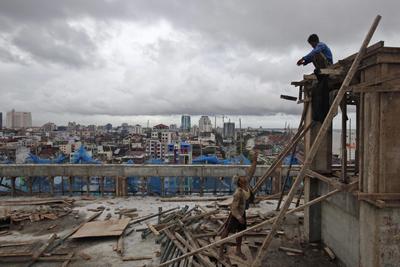Interpreted as a move to bring capable technocrats into the inner policy-making circles of his government, the reshuffle appears intended to give the president more scope to limit the influence of the conservatives among the military representatives in the Parliament. Approved on the final day of the parliamentary session, the re-organisation is seen as emphasising two key aspects of Myanmar’s continuing evolution towards full democratic governance: economic reform and an inclusive peace with Myanmar’s ethnic minorities. The changes enable the president to draw on ministers and deputy ministers with sound economic credentials, who are expected to support Thein Sein’s reformist program. The changes will also see the two ministries of electric power streamlined into one and the abolition of the Myanmar Industrial Development Ministry. This will leave the government operating around 31 ministries, but with an overall increase in the number of ministers and deputy ministers to 36, including 15 new deputy ministers.
The ministers attached to the President’s Office will now increase to six, a change expected to expedite decision making in the President’s office. These new recruits include U Aung Min (former minister for rail transportation), who is recognised as contributing to the ceasefire talks with Myanmar’s ethnic minority armies; U Hla Tun (former minister for finance) and U Soe Thein (former minister for industry), both considered key contributors to ongoing economic reforms. In another first, Dr Myat Myat Ohn Khin, a medical doctor and former deputy minister for health, has been appointed minister for social welfare, relief and resettlement, the ‘first and only’ female minister in the cabinet. Also joining the cabinet is key economic adviser U Set Aung, a move interpreted as a sign of ‘growing political openness’.
Another change considered very significant for those monitoring Myanmar’s democratic progress is the removal of the powerful former minister for information, U Kyaw Hsan (who will now become the minister for cooperatives), and his replacement by former labour minister, U Aung Kyi. As minister for information, U Kyaw Hsan presided over the pre-publication censorship of the press, no longer appropriate in view of the president’s attempts to remove restrictions on media freedom. Another change seen as strengthening the hand of the reformers is the replacement of arch-conservative Thiha Thura U Tin Aung Myint Oo (resigned for ‘health’ reasons) by the navy chief Admiral Nyan Tun, who will now become one of Myanmar’s vice-presidents. Admiral Nyan Tun is seen as a moderate, believed to be committed to the reform process and not to have been involved in human rights violations. The other significant change is the replacement of former defence minister Lieutenant General Hla Min by Lieutenant Gen Wai Lwin. Overall, President Thein Sein seems to be drawing on the strengths of moderate elements in the military, as well as capable technocrats and civilians on whom he can rely to carry forward his reform agenda.
The changes have been welcomed by a wide variety of representatives, including those from some of Myanmar’s key ethnic minority groups. But notably absent among the commentary is any direct mention of the education portfolio, recently the centre of controversy because proposed legislation has supported greater autonomy for the universities. Shortly before the August cabinet reshuffle, Dr Myo Myint was moved from the foreign affairs portfolio to become one of the new deputy ministers in the education ministry, where he will also be responsible for international relations, indicating that Myanmar expects to increase its collaboration with foreign universities and academics. However, given that a key critic of the draft legislation put forward by the minister for education, Dr Mya Aye, is the powerful speaker of the Lower House (the Pyithu Hluttaw), Shwe Mann, this piece of legislation could be one of the litmus tests for the new cabinet line-up, since universities have always been considered important sites for the mobilisation of democratic voices. Concurrent with its approval of the new ministerial line-up though, Parliament also approved the new foreign direct investment law, designed to offer greater incentives to foreign companies to invest in Myanmar, a clear sign that economic reform is at the top of the president’s agenda.
Helen James is Associate Professor at the Australian Demographic & Social Research Institute, the Australian National University.

